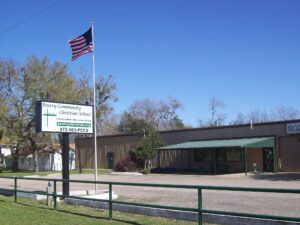Last updated on October 20, 2019
Texas voters are about to weigh in on 10 proposed amendments to the state constitution, which deal with everything from retiring law enforcement animals to the state’s tax code.
Early voting begins Monday and runs through Nov. 1. Election Day is Nov. 5.
During this year’s legislative session, lawmakers passed several bills that require amendments to the Texas Constitution. A simple majority of Texas voters must vote to support any change to the state constitution in a statewide referendum.
Below are the 10 amendments on the ballot next month. More analysis on each proposition, from the House Research Organization, is available here.
Here are the constitutional propositions that Texans will be voting on:
Proposition 1
What the ballot will say: “The constitutional amendment permitting a person to hold more than one office as a municipal judge at the same time.”
What it means: Municipal court judges adjudicate city ordinance violations and certain misdemeanor criminal cases. The proposition would permit elected municipal court judges to serve multiple municipalities at the same time. Only appointed municipal court judges can serve multiple jurisdictions at the same time. Some argue that this makes it more challenging for small and rural cities to find qualified candidates.
Proposition 2
What the ballot will say: “The constitutional amendment providing for the issuance of additional general obligation bonds by the Texas Water Development Board in an amount not to exceed $200 million to provide financial assistance for the development of certain projects in economically distressed areas.
What it means: In areas where the median household income is at or below 75% of the statewide median income level, the TWDB would be allowed issue bonds to fund for water and wastewater infrastructure projects.
Proposition 3
What the ballot will say: “The constitutional amendment authorizing the legislature to provide for a temporary exemption from ad valorem taxation of a portion of the appraised value of certain property damaged by a disaster.”
What it means: This would allow temporary property tax exemptions to be made by Legislation for people with property damaged in governor-declared disaster areas. The Legislature would be able to pass laws determining the eligibility requirements for the exemptions. The laws would be able to specify the duration and amount of any write-offs during the period.
Proposition 4
What the ballot will say: “The constitutional amendment prohibiting the imposition of an individual income tax, including a tax on an individual’s share of partnership and unincorporated association income.”
What it means: This would make it much more challenging for future lawmakers to enact a personal income tax, requiring support from two-thirds of the House and Senate and a majority of Texas voters. Currently, the state Constitution requires that any proposal be approved a majority of lawmakers in the House and Senate and a majority of voters in a state-wide referendum. The way the proposition is worded on the ballot may be confusing, but passing this proposition would ban creating a personal income tax in Texas.
Proposition 5
What the ballot will say: “The constitutional amendment dedicating the revenue received from the existing state sales and use taxes that are imposed on sporting goods to the Texas Parks and Wildlife Department and the Texas Historical Commission to protect Texas’ natural areas, water quality, and history by acquiring, managing, and improving state and local parks and historic sites while not increasing the rate of the state sales and use taxes.”
What it means: Proposition 5 will change the Texas Constitution so that money generated from the existing sales tax on sporting goods can only go to the Texas Parks and Wildlife Department and the Texas Historical Commission as it was intended when the tax was created in 1993.
Proposition 6
What the ballot will say: “The constitutional amendment authorizing the legislature to increase by $3 billion the maximum bond amount authorized for the Cancer Prevention and Research Institute of Texas.”
What it means: This would allow the Legislature to double the maximum amount of bonds it can issue on behalf of the Cancer Prevention and Research Institute of Texas, from $3 billion to $6 billion.
Proposition 7
What the ballot will say: “The constitutional amendment allowing increased distributions to the available school fund.”
What it means: This would allow the General Land Office, the State Board of Education and other entities to double the amount of revenue they can provide the Available School Fund each year. The Available School Fund provides classroom materials and funding for Texas schools.
Proposition 8
What the ballot will say: “The constitutional amendment providing for the creation of the flood infrastructure fund to assist in the financing of drainage, flood mitigation, and flood control projects.”
What it means: This would create a flood infrastructure fund that the Texas Water Development Board could use to finance projects following a disaster. It would also designate where revenue for the fund can come from. Proposition 8 is one of three amendments which received the unanimous support of (present) Democrats and Republicans in the Texas State Legislature.
Proposition 9
What the ballot will say: “The constitutional amendment authorizing the legislature to exempt from ad valorem taxation precious metal held in a precious metal depository located in this state.”
What it means: This would allow the legislature to create a property tax exemption for precious metals held in state depositories — like the Texas Bullion Depository, scheduled to open next year in Leander.
Proposition 10
What the ballot will say: “The constitutional amendment to allow the transfer of a law enforcement animal to a qualified caretaker in certain circumstances.”
What it means: It would allow for former handlers or qualified caretakers to adopt retired law enforcement animals without a fee. Under the state’s Local Government Code, a retiring police dog or working animal is classified as salvage or surplus property and, according to code, surplus or salvage property can be auctioned, donated to a civic or charitable organization, or destroyed. According to the Texas Senate Research Center, the existing Local Government Code makes transferring a retiring animal to its handler difficult. Proposition 10 would allow agencies to transfer a dog, horse, or another animal to the animal’s handler or another qualified person if the transfer is in the animal’s best interest.
Early Voting for the upcoming November 5th Election will begin October 21st and end on November 1st.
You can check here to see if you are registered and what precinct you are in.
You can visit the website for the Elections Office, www.rockwallvotes.com, where you will find information and links to party pages.
The Elections Office is located at 915 Whitmore Dr., Suite D (the same plaza where DPS is located) The Elections Office is not a polling location. You can find a list of polling locations here.
Check your registration status here: https://www.rockwallvotes.com/voter-infor…






























